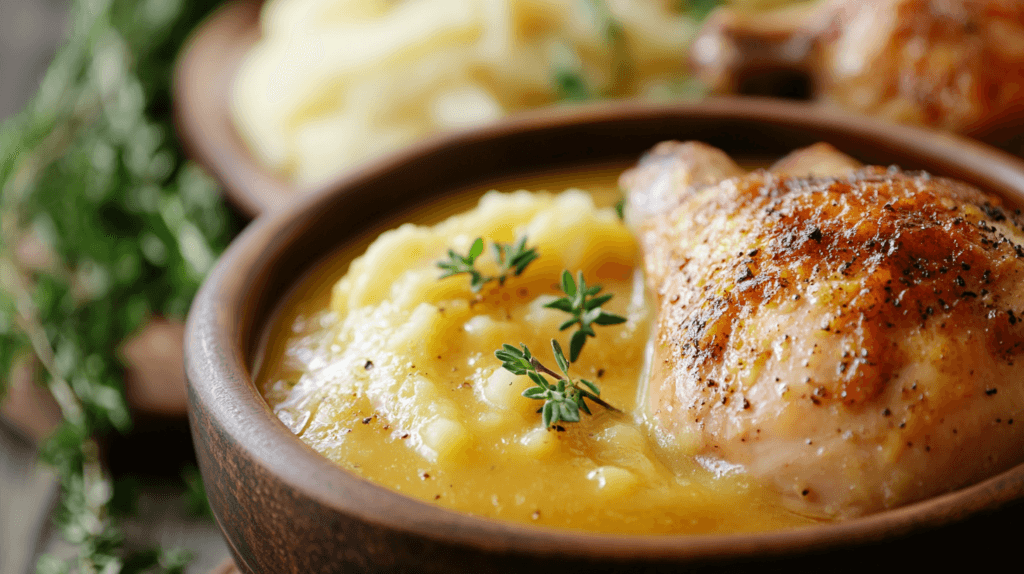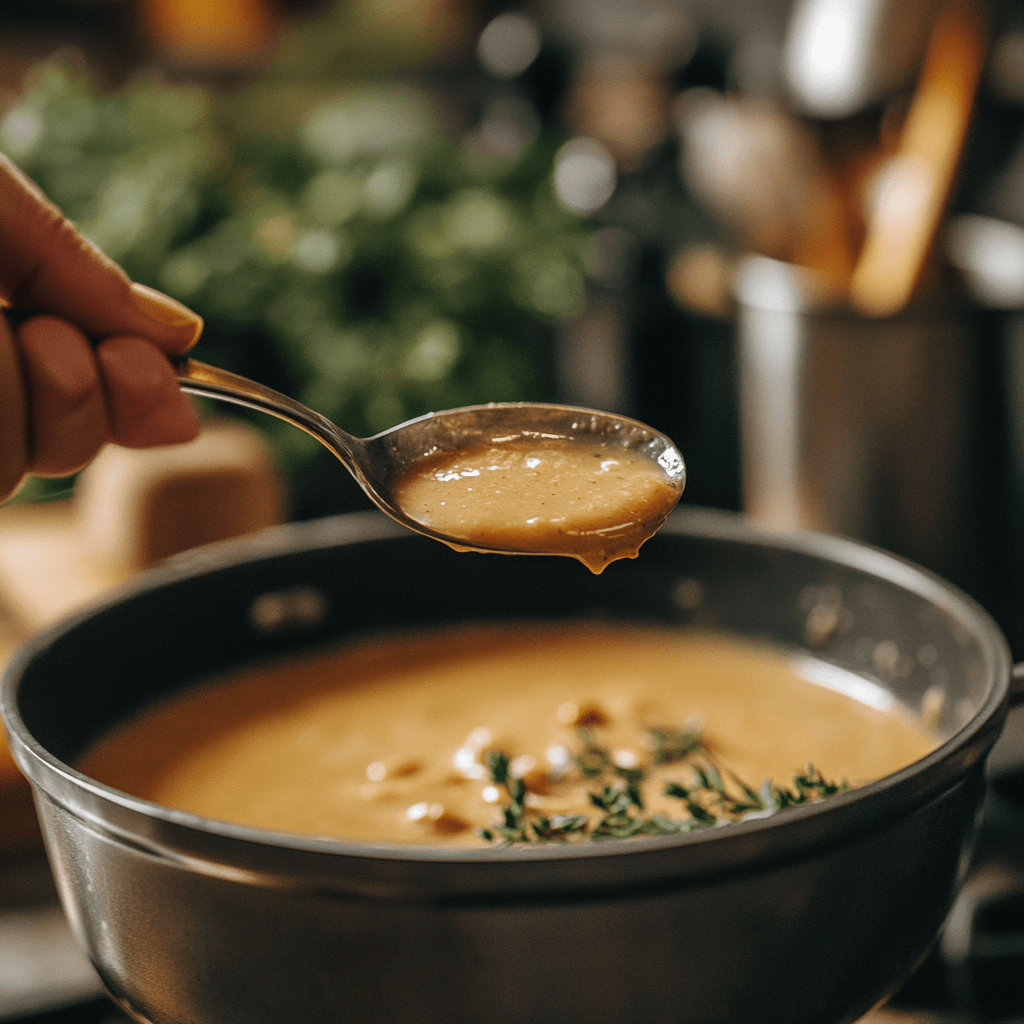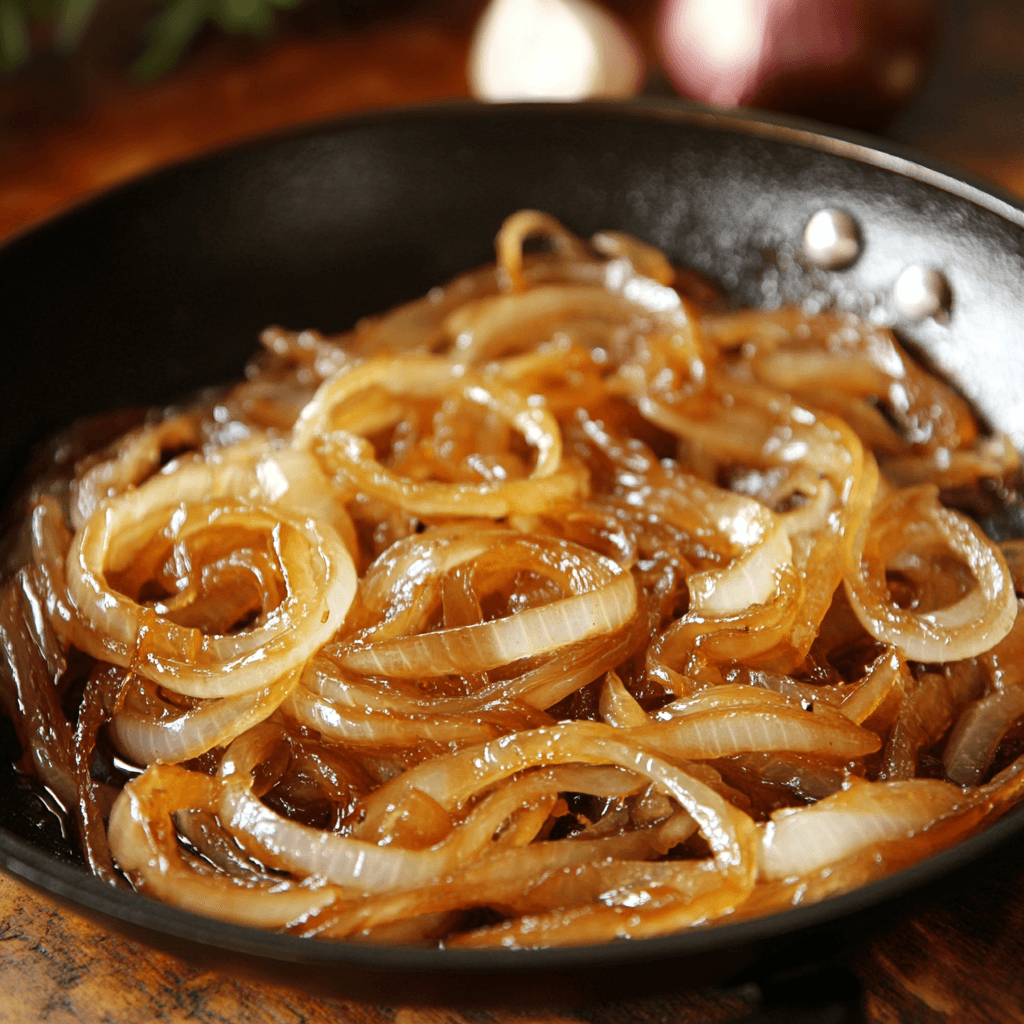Chicken gravy is a versatile and essential component in many cuisines worldwide. However, achieving the perfect balance of flavors can sometimes be tricky, especially when bitterness creeps in. Learning how to reduce bitterness in chicken gravy is key to creating a smooth, savory sauce that enhances your dishes. Whether paired with roasted chicken, mashed potatoes, or casseroles, a well-made chicken gravy transforms meals into comforting and memorable experiences.
To successfully reduce bitterness in chicken gravy, it’s important to understand the common causes of bitterness. Overcooked roux, burnt spices, or excessive herbs can all contribute to an unpleasant taste. By identifying these factors and applying simple techniques, you can adjust the flavor and ensure a well-balanced gravy.

Table of Contents
Common Reasons Why Chicken Gravy Turns Bitter
While chicken gravy can enhance the flavor of a dish, it is also susceptible to bitterness if not prepared carefully. To effectively reduce bitterness in chicken gravy, it’s essential to understand the common causes behind this unpleasant taste. Here are some key factors that can lead to bitter gravy:
- Burnt Roux or Ingredients: A roux, the base of many gravies, can quickly become burnt if cooked for too long or over high heat. Similarly, caramelized onions, garlic, or spices may char and impart a bitter taste.
- Overcooked Herbs or Spices: Fresh or dried herbs like thyme, rosemary, or bay leaves can become bitter if they are simmered too long. Spices, particularly pepper, can also overwhelm the gravy if not balanced properly.
- Burnt Chicken Drippings: The flavorful drippings left after roasting chicken are crucial for gravy. However, if the drippings burn or stick excessively to the pan, they contribute bitterness instead of savory richness.
- Poor-Quality Stock or Broth: Low-quality or overly concentrated chicken stock can have an unpleasant taste. Store-bought broths, especially those with preservatives or excessive salt, may introduce bitter undertones to the gravy.
- Improper Deglazing: When deglazing the pan to loosen flavorful bits, using the wrong liquid, like an overly acidic wine or burnt broth, can result in a bitter aftertaste.
- Scorched Milk or Cream: If the recipe includes milk, cream, or other dairy, overheating them can cause scorching, leading to an undesirable bitter flavor.
Understanding the Causes of Bitterness
Overcooked Chicken or Chicken Bones
One of the primary causes of bitterness in chicken gravy is overcooking the chicken or its bones. When chicken bones or meat are simmered too long, especially at high heat, they can release unpleasant flavors, leading to a bitter taste. To reduce bitterness in chicken gravy, it’s crucial to avoid over-extracting the bones. Overcooked bones can result in a bitter or metallic taste due to compounds like marrow or scorched proteins being released.
For the best results and to reduce bitterness in chicken gravy, proper simmering time and temperature are essential. Boiling aggressively can extract excessive bitter compounds, so instead, simmer the bones gently for the recommended duration. By following this technique, you can reduce bitterness in chicken gravy and achieve a smooth, rich, and savory sauce without unpleasant flavors.
Excessive Use of Spices and Herbs
While herbs and spices add depth and aroma to chicken gravy, excessive use can easily overpower the dish, leading to bitterness. To reduce bitterness in chicken gravy, it’s essential to use strong herbs like rosemary, thyme, or sage in moderation. These potent herbs can become overwhelming if added in large quantities or cooked for too long.
Similarly, spices such as black pepper, cloves, or bay leaves can contribute to bitterness if not carefully balanced. To effectively reduce bitterness in chicken gravy, taste the sauce periodically during cooking and adjust the seasonings as needed. This ensures a well-rounded, harmonious flavor without unwanted bitterness.
High Heat Cooking Methods
Cooking chicken gravy over excessively high heat can cause several issues that lead to bitterness. To reduce bitterness in chicken gravy, it’s crucial to avoid high temperatures that can burn ingredients like onions, garlic, or flour, leading to a bitter aftertaste. Additionally, rapid boiling can cause fats and proteins to scorch at the bottom of the pan, which may taint the entire gravy with an unpleasant flavor.
To effectively reduce bitterness in chicken gravy, always use gentle, controlled heat throughout the cooking process. Instead of boiling aggressively, simmering allows all elements to combine smoothly. This technique ensures a rich, well-balanced, and flavorful gravy without introducing bitterness. By maintaining the right cooking temperature, you can consistently reduce bitterness in chicken gravy and create a perfect, savory sauce every time.
Burnt Flour or Roux
The roux, made from cooking flour and fat, is a foundational element in many gravies. However, if the flour is cooked too long or at high heat, it can burn quickly and develop a bitter taste. To reduce bitterness in chicken gravy, it’s crucial to prepare the roux carefully. A burnt roux will carry its bitterness throughout the entire gravy, as it serves as the thickening agent.
To effectively reduce bitterness in chicken gravy, cook the flour over low to medium heat, stirring constantly until it reaches a golden or light brown color. Avoid high temperatures, as they can cause scorching, leading to an unpleasant flavor. If you notice blackening or a burnt smell, it’s best to start fresh to preserve the flavor and successfully reduce bitterness in chicken gravy.
Balancing the Flavors in Chicken Gravy
Sweetness vs. Bitterness in Gravy
Balancing sweetness and bitterness is essential for achieving a harmonious chicken gravy. Bitterness can stem from burnt ingredients, overcooked bones, or excessive spices, but it can be effectively counteracted with a touch of sweetness. To reduce bitterness in chicken gravy, consider adding natural sweeteners such as honey, sugar, or maple syrup. These ingredients help mask bitterness while maintaining the savory depth of the gravy.
Additionally, vegetables like carrots or caramelized onions can introduce subtle sweetness, further enhancing the balance of flavors. To effectively reduce bitterness in chicken gravy, carefully adjust the sweet and savory elements to create a smooth, well-rounded sauce. This approach ensures that every dish featuring chicken gravy maintains richness and depth without any overpowering bitterness.
The key is moderation—too much sweetness can make the gravy cloying and detract from its savory appeal. To effectively reduce bitterness in chicken gravy, taste the sauce as it simmers and adjust the flavors gradually. This careful approach helps achieve the perfect balance between bitter and sweet notes, ensuring a smooth, well-rounded gravy that enhances any dish.
The Role of Salt and Acid in Flavor Balance
Salt and acid play a crucial role in balancing the flavors of chicken gravy.
- Salt: Salt enhances savory elements and brings out the natural flavors of the chicken and other ingredients. If the gravy tastes flat or slightly bitter, a pinch of salt can often restore balance by reducing the perception of bitterness and amplifying other flavors. However, care should be taken to avoid over-salting, as this can overshadow the dish entirely.
- Acid: Acidic ingredients such as a splash of lemon juice, vinegar, or a dash of wine can brighten the gravy and cut through bitterness. Acid works by counteracting heavy, bitter notes and adding a fresh, lively dimension to the flavor profile. For example, a few drops of lemon juice can transform an otherwise dull or bitter gravy into a more vibrant and palatable sauce.
Together, salt and acid act as powerful flavor enhancers, helping to neutralize bitterness and create a well-rounded, satisfying gravy. To effectively reduce bitterness in chicken gravy, carefully balance these elements to achieve the perfect harmony of savory, sweet, and acidic notes. This ensures a rich, flavorful sauce that enhances any dish without unwanted bitterness.
How to Identify Bitterness in Gravy

Taste Tests and Indicators
The most effective way to identify bitterness in chicken gravy is through regular taste tests during the cooking process. Bitterness often presents as a sharp, lingering, or unpleasant flavor that disrupts the savory balance of the gravy. To successfully reduce bitterness in chicken gravy, it’s essential to recognize these flavor imbalances early. Here are a few key indicators and steps to help identify and correct bitterness:
- Regular Tasting: Continuously taste the gravy as it simmers to detect any unwanted flavors early. This allows for timely adjustments, such as adding sweetness, acid, or salt.
- Lingering Aftertaste: Bitterness is often identified through its lingering and sharp aftertaste. If the flavor feels harsh or sticks to the palate after tasting, bitterness may be the issue.
- Visual Indicators: Check for signs of burnt ingredients. Overly darkened roux, scorched vegetables, or blackened bits at the bottom of the pan often signal bitterness.
- Smell: A burnt or acrid smell during cooking is a strong indicator of bitterness. If something smells scorched, there is a high chance it will taste bitter as well.
By tasting frequently and observing visual and aromatic cues, cooks can identify bitterness in chicken gravy early and take corrective measures before the gravy is fully prepared. This proactive approach helps reduce bitterness in chicken gravy, ensuring a smooth, well-balanced, and flavorful sauce that enhances any dish.
Common Mistakes That Lead to Bitter Gravy
Bitterness in chicken gravy typically results from small oversights or cooking errors. To effectively reduce bitterness in chicken gravy, it’s important to recognize common mistakes that contribute to unpleasant flavors. Here are some of the most frequent errors that can lead to bitter gravy:
- Burning the Roux: The roux is the backbone of many gravies, but cooking it too long or at high heat can quickly lead to a burnt, bitter taste. A properly cooked roux should be golden to light brown, not dark or scorched.
- Overcooking Ingredients: Over-sautéing garlic, onions, or spices can result in a burnt or bitter flavor. These ingredients should be cooked gently to release their flavors without charring.
- Burnt Drippings: While chicken drippings are essential for flavor, burnt bits left in the pan can transfer bitterness to the gravy. Deglaze the pan carefully and avoid scraping any excessively darkened residues.
- Too Many Spices or Herbs: Overusing strong spices like black pepper, cloves, or bay leaves, or simmering fresh herbs for too long, can make the gravy taste overly bitter and unbalanced.
- Using Low-Quality Stock or Broth: Store-bought broths with preservatives or overly concentrated flavors may introduce bitterness. Opt for homemade stock or high-quality broth to ensure a cleaner taste.
- Cooking at High Heat: Rapid boiling or cooking at excessively high temperatures can scorch the gravy and cause undesirable flavors. Gravy should be simmered gently and stirred frequently.
Preventing Bitterness While Cooking Chicken Gravy
Choosing the Right Chicken Parts
The choice of chicken parts plays a crucial role in determining the flavor of the gravy. Not all chicken cuts contribute equally to a balanced, savory sauce, and some may introduce bitterness if not used properly. To effectively reduce bitterness in chicken gravy, consider selecting flavorful, well-balanced chicken parts while avoiding those that can overpower the dish. Here are some key tips to ensure a smooth, rich gravy without unwanted bitterness:
- Opt for Fresh, Quality Cuts: Fresh chicken produces better-tasting gravy. Avoid using overly processed or frozen chicken, which may carry off-flavors.
- Use the Right Bones: Chicken bones, particularly from the thighs, wings, or carcass, provide excellent flavor without overpowering the gravy. Avoid using charred or overly browned bones, as they can introduce bitterness.
- Trim Excess Fat: Excess skin or fat can burn during roasting or simmering, leading to a bitter or greasy gravy. Trimming the chicken beforehand ensures a cleaner, smoother result.
- Avoid Over-Roasted Parts: Overly dark or burnt chicken pieces, especially when pan-roasting, can carry a bitter aftertaste. Use golden-browned drippings and gently roasted parts for the best flavor.
By carefully selecting chicken parts, you ensure a flavorful foundation that avoids any bitter notes.
Cooking Temperature and Timing
Temperature and timing play a critical role in preventing bitterness while cooking chicken gravy:
- Low and Slow Cooking: Simmer the gravy gently rather than boiling it at high heat. Rapid boiling can scorch the flour, burn the drippings, or over-extract bitter compounds from the bones.
- Proper Roasting of Drippings: If using roasted chicken drippings, ensure they are golden-brown rather than dark or burnt. Overcooked drippings are a common source of bitterness.
- Monitor the Roux: A roux must be cooked over low to medium heat and stirred constantly to avoid burning. Stop cooking once the desired golden or light brown color is achieved.
- Avoid Over-Simmering Bones: While simmering chicken bones adds depth, overcooking them for too long can release bitter, metallic flavors. Stick to the recommended cooking times (1–2 hours for stock).
Maintaining the right temperature and timing ensures the gravy develops a smooth and savory taste without the risk of burning or bitterness.
Proper Use of Seasonings and Spices
Seasonings and spices are essential for flavor, but improper use can lead to bitterness. Here’s how to use them effectively:
- Use Spices Sparingly: Strong spices like black pepper, cloves, and bay leaves should be used in moderation. Start with small quantities and adjust gradually during cooking.
- Fresh Herbs at the Right Time: Add delicate fresh herbs, such as parsley or thyme, toward the end of cooking to prevent them from overcooking and turning bitter. Dried herbs should be added earlier but in small amounts.
- Balance Strong Flavors: If bitterness occurs due to spices or herbs, balance it with a touch of sweetness (e.g., honey, sugar) or acidity (e.g., lemon juice, vinegar).
- Avoid Overpowering Garlic or Onion: Sauté garlic and onions gently until soft and translucent. Over-browning or burning these ingredients can result in bitterness.
By carefully measuring and timing the addition of seasonings and spices, you can enhance the flavor of chicken gravy without risking bitterness.
Adding Sweetness to Counteract Bitterness

Using Sugar and Honey in Small Amounts
When bitterness creeps into chicken gravy, adding a touch of sweetness can help restore balance and improve the overall flavor profile. Small amounts of sugar or honey can effectively mask bitterness without overpowering the savory nature of the dish.
- Sugar: White or brown sugar can be used in tiny amounts to counteract bitterness. Brown sugar is particularly useful as it adds a subtle molasses-like sweetness that complements the richness of the gravy. Start with no more than 1/4 teaspoon at a time, tasting as you go to avoid making the gravy overly sweet.
- Honey: A small drizzle of honey works wonders to soften bitterness while adding a natural, rounded sweetness. Honey should be added sparingly, as it can quickly dominate the flavor if overused. Its smooth, mild sweetness pairs well with chicken-based gravies.
Pro Tip: When using sugar or honey, always add in increments and stir thoroughly to ensure the sweetness is evenly distributed. Gradual adjustments allow you to find the perfect balance without compromising the savory integrity of the gravy.
Adding Caramelized Onions for Sweetness
Caramelized onions are a natural and flavorful way to introduce sweetness into chicken gravy while enhancing its depth and complexity. When onions are cooked slowly over low heat, their natural sugars break down and develop a rich, sweet, and slightly nutty flavor that balances bitterness beautifully.
- Preparing Caramelized Onions:
- Slice onions thinly and cook them over low heat with a small amount of butter or oil.
- Stir frequently and allow the onions to turn soft and golden-brown without burning, which could reintroduce bitterness.
- This process may take 15–20 minutes but is worth the effort for the depth of flavor.
- Incorporating into Gravy:
- Blend or finely chop the caramelized onions and add them directly to the gravy.
- Allow them to simmer gently, melding their sweetness with the other flavors.
- Benefits: Caramelized onions not only counteract bitterness but also add richness and texture, making the gravy more robust and satisfying.
FAQ
Common Questions About Chicken Gravy and Bitterness
1. Why does my chicken gravy taste bitter?
Bitterness in chicken gravy is often caused by burnt ingredients, such as overcooked roux, scorched drippings, or caramelized vegetables. Overusing strong spices or simmering chicken bones for too long can also introduce bitter notes.
2. How can I fix bitter chicken gravy?
To fix bitter chicken gravy, try the following solutions:
- Add a small amount of sugar, honey, or maple syrup to counteract bitterness.
- Incorporate acidity, such as a splash of lemon juice or vinegar, to balance the flavors.
- Add caramelized onions for natural sweetness.
- Taste and adjust with a pinch of salt, which can reduce the perception of bitterness.
3. Can burnt roux ruin my gravy?
Yes, a burnt roux will impart a bitter taste to the entire gravy, making it difficult to reduce bitterness in chicken gravy once incorporated. If your roux smells or looks burnt, it’s best to discard it and start fresh. To prevent bitterness, cook the flour and fat over low to medium heat, stirring constantly until it reaches a golden or light brown color. This ensures a smooth, flavorful gravy without unpleasant bitter notes.
4. How can I prevent bitterness while making chicken gravy?
To prevent bitterness:
- Use fresh, high-quality chicken and ingredients.
- Simmer the gravy gently at a low temperature. Avoid boiling aggressively.
- Do not overcook the roux, chicken bones, or spices.
- Regularly taste the gravy as it cooks to identify and correct any issues early.
5. What spices or herbs can cause bitterness in gravy?
Overusing strong spices like black pepper, cloves, or nutmeg, or herbs like rosemary, sage, or bay leaves, can lead to bitterness. These ingredients should be added sparingly and tasted frequently to ensure balance.
6. Can I use sweet ingredients to balance bitter gravy?
Yes, adding small amounts of sweeteners like sugar, honey, or caramelized onions can effectively mask bitterness and restore flavor balance. However, always add sweeteners gradually and in moderation to avoid making the gravy overly sweet.
7. How do burnt drippings affect chicken gravy?
Burnt drippings from roasting or frying chicken can introduce a bitter and unpleasant flavor to the gravy, making it difficult to reduce bitterness in chicken gravy. To avoid this, deglaze the pan carefully and refrain from scraping burnt bits, as they can intensify bitterness. Instead, use only golden-brown drippings to enhance the rich, savory flavor of the gravy, ensuring a smooth and well-balanced sauce.
8. Is it possible to overcook chicken bones when making gravy?
Yes, overcooking chicken bones during stock preparation can release bitter or metallic flavors. Simmer the bones gently for 1–2 hours and avoid boiling aggressively to prevent over-extraction.
By addressing these common concerns, you can create smooth, flavorful chicken gravy free from bitterness, ensuring a satisfying and enjoyable result every time.
Conclusion
Final Tips for Making Perfect, Non-Bitter Chicken Gravy
Creating a smooth, flavorful chicken gravy without bitterness requires attention to detail and careful preparation. Here are some final tips to ensure success:
- Use Quality Ingredients: Start with fresh chicken, high-quality stock, and fresh herbs to build a clean and rich flavor base.
- Control Heat: Cook the roux and gravy over low to medium heat to avoid burning the flour, drippings, or other ingredients. Gentle simmering is key.
- Taste Frequently: Regularly taste the gravy throughout the cooking process to detect and correct any bitterness early.
- Add Sweetness Sparingly: If bitterness occurs, balance it with small amounts of sugar, honey, or caramelized onions. Gradual adjustments are essential.
- Balance with Acid and Salt: A splash of lemon juice, vinegar, or a pinch of salt can neutralize bitterness and bring harmony to the flavors.
- Avoid Overcooking Bones and Herbs: Simmer chicken bones gently without boiling, and use herbs and spices in moderation to prevent overpowering the gravy.
By following these tips, you can consistently achieve a rich, savory chicken gravy that enhances any meal.
Recap of Key Points for Reducing Bitterness
To summarize, here are the key strategies to reduce and prevent bitterness in chicken gravy:
- Avoid Burnt Ingredients: Be mindful of overcooking the roux, drippings, or vegetables, as burnt elements are a major cause of bitterness.
- Monitor Heat and Cooking Time: Cook at a controlled, gentle temperature and avoid over-simmering bones or herbs.
- Balance Flavors: Counteract bitterness with sweetness (sugar, honey, or caramelized onions), acidity (lemon juice or vinegar), or a pinch of salt.
- Use Spices and Herbs Wisely: Add spices and herbs sparingly, and taste regularly to prevent them from overpowering the gravy.
- Choose Quality Ingredients: Use fresh chicken, high-quality stock, and golden-brown drippings to ensure a clean, balanced flavor.
By focusing on these techniques, you can create the perfect chicken gravy—rich, smooth, and free from any bitter undertones. Whether it’s for a family dinner or a special occasion, mastering these steps will elevate your cooking and delight your guests.
Print
How do you reduce bitterness in chicken gravy?
Description
If your chicken gravy tastes bitter, try these methods to balance or reduce bitterness:
1. Add a Touch of Sweetness
- A pinch of sugar, honey, or maple syrup can neutralize bitterness. Start with a small amount and adjust to taste.
- Caramelized onions or roasted carrots can add natural sweetness.
2. Balance with Fat
- Stir in a pat of butter, cream, or milk to smooth out bitterness.
- A splash of heavy cream or coconut milk can also help mellow the flavors.
3. Use Acid to Brighten the Flavor
- A squeeze of lemon juice, apple cider vinegar, or a splash of white wine can cut through bitterness.
- Tomato paste (if it fits the recipe) can also balance flavors.
4. Check Your Ingredients
- Overcooked garlic or burnt flour can cause bitterness. Next time, cook them gently over low heat.
- Avoid using burnt drippings from the pan—strain out dark bits before making the gravy.
5. Dilution & Adjustment
- If the bitterness is strong, dilute the gravy with more chicken stock.
- Adding mashed potatoes or pureed vegetables (like carrots or squash) can absorb some bitterness.
